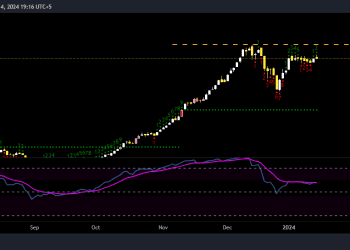The KSE-100 Index is a stock market index that represents the top 100 companies listed on the Pakistan Stock Exchange (PSX) based on their market capitalization. The Index was introduced in 1991 and is considered a benchmark to measure the overall performance of the stock market in Pakistan. It encompasses various sectors of the Pakistani economy, including financial services, oil & gas, telecommunications, pharmaceuticals, and consumer goods, making it a comprehensive indicator of the economic and corporate health of the country.
The KSE-100 operates on a free-float market capitalization method, meaning it only considers shares that are available for trading to the public; shares held by insiders, governments, or other locked-in shares are not included in the calculation of the index. This method provides a more accurate reflection of market dynamics and the true value of the stock market.
The performance of the KSE-100 is closely watched by both domestic and international investors as it provides insights into the economic situation in Pakistan, investor sentiment, and potential investment opportunities. Like other major market indices around the world, movements in the KSE-100 can be influenced by various factors, including economic policies, political stability, inflation rates, and global economic conditions.
The KSE-100 Index is the benchmark stock market index in Pakistan, consisting of the top 100 companies listed on the Pakistan Stock Exchange (PSX). Here is an analysis of the current state and trends in the Pakistan stock market:
- Performance Overview: The Pakistan stock market has experienced both ups and downs in recent times. The KSE-100 Index has shown resilience, with fluctuations influenced by various factors such as global economic conditions, geopolitical developments, and domestic policies.
- Recent Trends: In the recent period, the KSE-100 Index has witnessed volatility due to multiple factors impacting investor sentiment. Political uncertainty, changes in economic policies, and the COVID-19 pandemic have played significant roles in shaping market trends.
- Impact of Global Factors: The Pakistan stock market is not isolated from global economic trends. Movements in international markets, particularly those of major economies, can have an impact on investor confidence and influence the direction of the KSE-100 Index.
- Sector Performance: Different sectors within the Pakistan stock market have shown varying levels of performance. Industries such as banking, energy, telecommunications, pharmaceuticals, and technology have traditionally held a significant presence in the market. However, market dynamics may shift as new sectors emerge and gain prominence.
- Investor Sentiment: Investor sentiment plays a crucial role in determining the overall direction of the market. Positive sentiment can drive buying activity, leading to an upward trend in stock prices. Conversely, negative sentiment can result in sell-offs and a downward pressure on stock prices.
- Government Policies: The policies and regulations implemented by the government can have a significant impact on the stock market. Reforms aimed at improving the ease of doing business, attracting foreign investment, and promoting economic growth can positively influence investor confidence and market performance.
- Economic Indicators: Key economic indicators, such as GDP growth, inflation rates, interest rates, and fiscal policies, directly impact the stock market. Positive economic indicators can bolster investor confidence and attract both domestic and foreign investment.
- Market Volatility: The Pakistan stock market is susceptible to volatility due to its relatively smaller size and the presence of both institutional and retail investors. Market volatility can present opportunities for investors, but it also carries risks that need to be carefully considered.
- Future Outlook: The future outlook for the Pakistan stock market remains subject to various factors. Continued economic reforms, political stability, improved governance, and positive investor sentiment can contribute to a more favorable market environment. However, uncertainties and risks, both domestic and global, need to be closely monitored.
Overall, the Pakistan stock market, represented by the KSE-100 Index, is influenced by a combination of domestic and global factors. It provides opportunities for investors while also carrying inherent risks. Careful analysis, a long-term perspective, and a diversified investment approach are essential for navigating the market effectively.



















